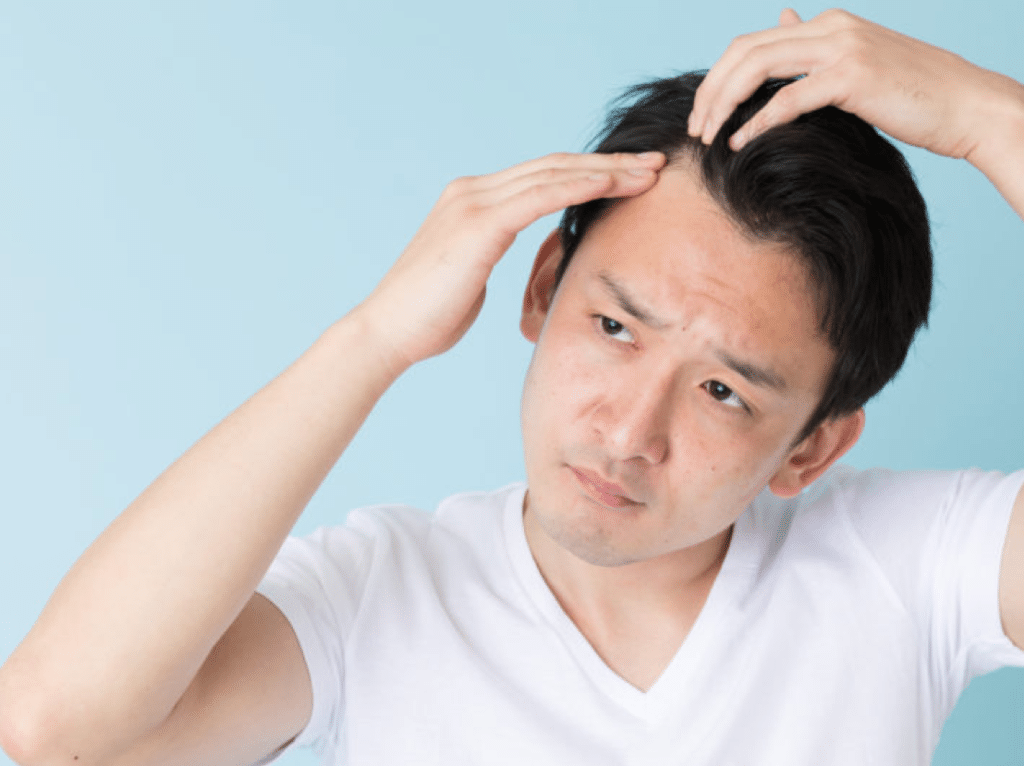Understanding the "why" of hair loss can inform the "how" of personalized treatment By HPI Contributing Partners: Bianca Garilli ND
Hair loss, or alopecia, is a common complaint by patients, male and female alike. It can affect localized regions (like the temples and crown of the head seen in male-pattern baldness), the entire scalp, and sometimes can even extend to other areas of the body. Typical hair loss is approximately 50-100 hairs per day, but those suffering from more extensive hair loss frequently notice increased hair loss after brushing or styling their locks or even when cleaning the sinks and sweeping their floors. (1) Hair loss can have a significant emotional and social impact on individuals. Understanding the underlying causes can be extremely helpful in creating an effective set of recommendations to mitigate hair loss.
Although hair loss or balding has a genetic component in many cases, there are also non-genetic, modifiable factors that may lead to hair loss. Let’s explore a few of the most common causes, including your genes, that underlie hair loss as well as targeted recommendations to reduce the loss. (1,2)
Heredity (genetic): Many people are convinced that their hair loss is hereditary and runs in the family. For cases of male-pattern baldness or female-pattern baldness (both also known as “androgenetic alopecia”), this would be correct. This form of balding typically occurs gradually as the person ages, often following specific patterns such as a receding hairline in males and thinning of hair in specific areas or over the whole scalp in women. (3)
The genetics of hair loss is complex. For example, over 200 independent, novel genetic correlates of male pattern baldness were identified in a recent genome-wide association study (GWAS), with a majority of those being autosomal related, while others were found to be X chromosome variants. (4) Another well-studied gene, the androgen receptor (AR) gene, is associated with hormonally-related balding and may contribute to androgenetic alopecia. (5)
Androgenetic alopecia is the most prevalent hair loss disorder globally.(6) This hereditary baldness affects over 80 million people in the US alone, creating a demand for effective treatments. (7) Hereditary balding may be caused in some part by excess androgens, when testosterone is converted into dihydrotestosterone (DHT) by 5-alpha-reductase (5AR) at higher-than-normal rates.8 Approaches to slow the rate of balding include reducing DHT levels or giving 5AR inhibitors. (8)
Beyond the conventional medicine prescription approach, non-Rx options on the market are numerous, including: L-cystine, caffeine-based lotions and shampoos, capsaicin, marine protein supplements, melatonin, procyanidins (a phytonutrient class of anti-inflammatory flavonoids found mainly in plants, including apples, barley, cocoa, cinnamon, grapes, and tea), pumpkin seed and rosemary oils, saw palmetto, zinc, and various others. (9)
 Hormones: Hormonal changes associated with various life stages including pregnancy, childbirth, and menopause or fluctuation in thyroid function and thyroid hormone levels can also lead to temporary and sometimes permanent hair loss. Partnering with a healthcare provider who practices personalized lifestyle medicine is key to balancing hormone levels through individualized lifestyle changes and sometimes targeted nutritional supplementation or medications, such as hormone replacement therapy (HRT). (1)
Hormones: Hormonal changes associated with various life stages including pregnancy, childbirth, and menopause or fluctuation in thyroid function and thyroid hormone levels can also lead to temporary and sometimes permanent hair loss. Partnering with a healthcare provider who practices personalized lifestyle medicine is key to balancing hormone levels through individualized lifestyle changes and sometimes targeted nutritional supplementation or medications, such as hormone replacement therapy (HRT). (1)
Medical conditions and medications: Medical conditions may also be the culprit for some individuals’ hair loss; these conditions may include infections such as ringworm, conditions with mental health underpinnings (e.g., trichotillomania, a disorder involving recurrent, irresistible urges to pull out body hair), and a relatively common condition called alopecia areata. (1,7) The latter has a lifetime incidence of 2% globally and is an immune-mediated condition that creates smooth, round patches of hair loss on the scalp or body; characterized by unpredictability, spontaneous regrowth as well as possible relapse periods. (6)
Identifying and treating the root causes of the medical condition can lead to hair regrowth, so it is prudent to seek out clinician experts who know how to utilize a Functional Medicine lens. In some cases, medications used to treat other health issues can induce hair loss as a side effect; these might include medications used for the treatment of cancer, arthritis, depression, heart problems, gout, and high blood pressure. (1)
Stress: The physiologic effects of stress are not limited to specific organs like the brain or heart. No, stress impacts whole body health, including increasing the risk of hair loss through various mechanisms, one of those being the pro-inflammatory milieu (i.e., hormones, cytokines, etc.) of stress in the body. (10) In recent years, the concept of a “brain-skin” connection has taken hold as a way to understand how stress may influence difficult-to-treat skin disorders such as psoriasis, atopic dermatitis, and urticaria, as well as its effect on hair loss. (11)
In particular, it is thought that “neurohormones, neurotransmitters, and cytokines, released during a stress response may also significantly influence the hair cycle.” (11) The growth of hair, the hair shaft production, and hair pigmentation, along with various other hair characteristics, may be impacted by the production of these stress-related molecules. (12) If hair loss is considered to be stress-related (which may be a possible underlying factor in Telogen effluvium, alopecia areata, trichotillomania, and hormone-related hair loss), a wide range of mind-body, naturopathic, and Functional Medicine approaches may be useful. (13)
Nutritional deficits: In some situations, sudden weight loss or protein deficiency can lead to hair loss. (2) Additionally, certain nutritional deficiencies can also exacerbate hair thinning and loss. These include iron, niacin, fatty acids, selenium, and zinc; conversely, excess intake of vitamins E and A may increase the risk of hair loss. (2) Although biotin (vitamin B7) is anecdotally thought to be useful for combating hair loss, available published research indicates that biotin supplementation may only yield helpful hair effects if a gross biotin deficiency (relatively rare) or hair syndrome (e.g., uncombable hair syndrome) exist. (14-15) Healthcare practitioners should use lab testing and physical exams to assess for nutritional insufficiencies or deficiencies, so a dietary plan and supplementation recommendations can be individualized and effective.
Beyond the above common reasons for hair loss, the following are also potential causes: radiation treatments, excessive hair styling, and certain types of hair treatments.
In summary, hair loss, although common, does not have to be permanent in all cases. Working with a Functional Medicine provider to determine the root causes of the hair loss is the first and best step in understanding the “why” of a patient’s hair concern and the “how” of the personalized treatment.
Citations
1. Mayo Clinic. Hair Loss. https://www.mayoclinic.org/diseases-conditions/hair-loss/symptoms-causes/syc-20372926. Accessed January 11, 2019.
2. Guo EL et al. Diet and hair loss: effects of nutrient deficiency and supplement use. Dermatol Pract Concept. 2017;7(1): 1–10.
3. NIH. Androgenetic alopecia. https://ghr.nlm.nih.gov/condition/androgenetic-alopecia. Accessed January 14, 2019.
4. Hagenaars S et al. Genetic prediction of male pattern baldness. PLoS Genet 2017;13(2):e1006594.
5. NIH Genetics Home Reference. AR gene. https://ghr.nlm.nih.gov/gene/AR. Accessed January 16, 2019.
6. Villasante Fricke AC et al. Epidemiology and burden of alopecia areata: a systematic review. Clin Cosmet Investig Dermatol. 2015;8:397-403.
7. American Academy of Dermatology. Hair loss. https://www.aad.org/public/diseases/hair-and-scalp-problems/hair-loss. Accessed January 14, 2019.
8. US Pharmacists. Treatment options for androgenetic alopecia. https://www.uspharmacist.com/article/treatment-options-for-androgenetic-alopecia. Accessed January 14, 2019.
9. Hosking AM et al. Complementary and alternative treatments for alopecia: a comprehensive review. Skin Appendage Disord. 2018. doi: 10.1159/00049203.5
10. Hadshiew IM et al. Burden of hair loss: stress and the underestimated psychosocial impact of telogen effluvium and androgenetic alopecia. J Invest Dermatol. 2004;123(3):455-457.
11. Botchkarev V. Stress and the hair follicle: exploring the connections. Am J Pathol. 2003;162(3):709–712.
12. Paus R. Exploring the “brain-skin connection”: leads and lessons from the hair follicle. Curr Res Transl Med. 2016;64(4):207-214.
13. Mayo Clinic. Stress management. https://www.mayoclinic.org/healthy-lifestyle/stress-management/expert-answers/stress-and-hair-loss/faq-20057820. Accessed January 16, 2019.
14. Trüeb RM. Serum biotin levels in women complaining of hair loss. Int J Trichology. 2016;8(2):73-77.
15. NIH. Biotin fact sheet for health professionals. https://ods.od.nih.gov/factsheets/Biotin-HealthProfessional/. Accessed January 16, 2019.
Bianca Garilli, ND, USMC Veteran
Dr. Garilli is a former US Marine turned Naturopathic Doctor (ND). She works in private practice in Northern California and consults with naturopathic and Functional Medicine leaders, including the Institute for Functional Medicine and Metagenics. She is passionate about optimizing health and wellness in individuals, families, companies, and communities- one lifestyle change at a time. Dr. Garilli has been on staff at the University of California Irvine, Susan Samueli Center for Integrative Medicine and is faculty at Hawthorn University. She is the creator of the Military and Veteran Health Initiative and is the current Past-President of the Children’s Heart Foundation, CA Chapter.









